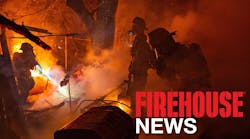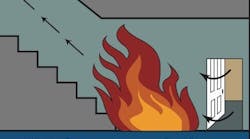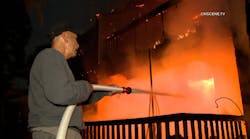The morning's plenary session included Toronto's experience with SARS, the "ABCs of Hepatitis," and strategies for preventing heart attacks by reducing heat stress.
Dr. Tom McLellan of Defence R&D Canada in Toronto presented his study on the heat stress of wearing firefighting gear while exercising in warm environments, which he used to establish safe work limits for Toronto firefighters.
McLellan warned that the heat stress a firefighter is undergoing cannot be determined by heart rate or comfort level. Also, a firefighter's core temperature may continue to rise for about 30 minutes while he rests, even though his heart rate has gone down. This is why a firefighter may feel fine and resume work, but then collapse within minutes.
McLellan said passive cooling is not enough to alleviate heat strain when operating in warm temperatures, and recommended careful hydration and cooling strategies such as forearm submersion in cool water.
Tuesday also marked the start of the conference workshops which included "New Fire Service Medical Standards," "Coping with Stress and Trauma," and "Infectious Disease Issues in the Fire Service."
The infectious disease workshop focused primarily on Hepatitis but also touched on HIV, smallpox, monkeypox, SARS and anthrax.
Dr. Ellen R. Kessler of Infectious Diseases Physicians, Inc. in Annanndale, VA, spoke about the possibility of contracting both HIV and Hepatitis C at the same time. She said a few of these cases have been documented since 1998, including one case in which a police officer contracted both diseases after a struggle with a suspect. She said this shouldn't be surprising because 15 to 30 percent of people infected with HIV also have Hepatitis C.
Dr. Thomas Hales, senior medical epidemiologist at NIOSH, addressed the issue of whether firefighters and EMTs are at increased risk of contracting bloodborne infections because of the nature of their work.
Controversy stirred on this subject a few years ago when Philadelphia firefighters drew attention to the epidemic of Hepatitis C among their ranks, while the CDC said that nationwide, firefighters do not have a higher prevalence of Hepatitis C than the general population.
Hales said that just because firefighters don't have a higher Hepatitis C prevalence doesn't mean they aren't more at risk. He said the stattistics don't show it when you compare firefighters to the entire U.S. population, but there is a difference. "It's not statistically significant, but it is real for those people," he said.
Hales said there's also a problem with the Hepatitis C statistics of the Philadelphia Fire Department. The CDC determined their infection rate to be 3 percent after asking for volunteers and testing only about 60 percent of the workforce, Hales said. This skews the results because anyone who already knew they had Hepatitis C wouldn't bother to get tested again, he argued. "My contention is there was some selection bias in that study," he said.
Hales praised the IAFF's strategy of seeking legislation to make Hepatitis C a presumptive occupational illness for rescue workers.
The workshop also featured talks from Dr. John Piacentino of Corporate Occupational Health Solutions in Gaithersburg, MD, and Capt. John R. Niemiec, infection control and prevention officer for the Fairfax County Fire and Rescue Department.
Niemiec suggested that the new Hepatitis G, which he said mimicks Hepatitis C and isn't being screened for yet at blood banks, could be "the next monster."
But while responders prepare for bio-terrorism attacks and new threats, they should continue to focus most on the threats they face every day such as Hepatitis C and HIV, he said. All of the speakers at the workshop stressed strategies for prevention and the importance of timely reporting of all occupational exposures.





